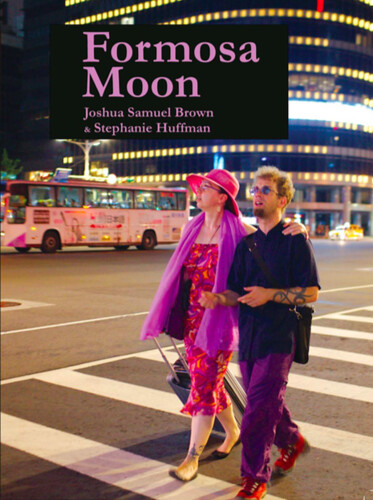Sit back and brainstorm: off the top of your head, how many comedy novels about Taiwan or set in Taiwan can you think of, which are available in English?
Until recently, for me the answer was ‘none’. Ghost Month has its amusing moments, but it’s more of a mystery thriller. Some travel writing and memoirs have fun anecdotes, but none is a proper comedy in the style of, say, Tom Robbins. Local literature in English translation can sometimes have droll moments, but Taiwanese writing tends overall to lean more into garden-path reflections than straight-up hijinx.
Of that number (zero), how many of those novels are Buddhist comedies?
Well, zero times any number...
Enter Spinning Karma. Written Joshua Samuel Brown, best known for his work on the Lonely Planet guides and certified Foreigner Who Has Spent A Long Time In Taiwan, this light and lovely but also thoughtfully-written comedy is exactly the right choice if you want a distraction from...well *gestures around vaguely* you know. This.
Quick disclosure: this review isn’t sponsored — I’m writing it because I feel like it. But, Joshua is a good friend.
The plot of Spinning Karma does an excellent job of, well, whirling around and then spinning back on itself. It starts with the story of “Rinpoche Schwartz”, a guy whose Staten Island accent I can straight-up hear through the page but who has somehow managed to become the head of a semi-legitimate Buddhist organization that originated with a disgraced ‘70s sex cult (don’t ask; just read.) It’s attracted a few true believers but has otherwise faded into obscurity since losing the sex-cult stuff and getting more into the Buddhism — some of it seemingly real, some of it explicitly admitted by our narrator to be pure bullshit.
From there, a series of events takes our blue-collar Buddhist master to Taiwan, where yet another series of events give Rinpoche Schwartz a half-baked idea to get more followers. Despite his best (okay, not his best) efforts to avoid an international incident, it...works. It’s never quite clear to what extent Schwartz fully aware of what he’s doing and to what extent he’s just propelled by a cluster of subconscious impulses that he just sort of gives into, one after the other. This is what makes him an interesting protagonist: is he a wholly cognizant scheister, a two-bit con man in a track suit, or is he a well-meaning doof being strung along by his own karma? It’s impossible to say.
From here, all I’ll tell you is to read on for the craziness to unfold. Don’t miss a few little neatly-wrapped gifts that Brown has left scattered in the text: not just the old-school Monty Python reference and the droll reaction to it by a well-meaning think tank liberal type, but those in the know should take note of what Schwartz’s daughter-in-law says about their cat.
In the end, as the title implies, the karma you spin out does tend to come back around to get you...just not always in the next lifetime, and certainly not in the ways you expect. The story ends with echoes, or perhaps mirror images, of how it began, which is probably from some sort of Buddhist parable that I know nothing about.
What I found most interesting about Spinning Karma was the way that it holds everyone accountable and doesn’t tiptoe around clear wrongdoing. And yet, Brown humanizes each character, while not pretending that, say, China is a wonderful country of openness and tolerance, or that the mainstream media is a whirling cesspool spinning its own narratives that shape how we, an uncritically consuming public, see the world. Without diving into both-sidesism, Brown points out that even characters with the best of intentions can sometimes do things that have consequences they haven’t really thought through. This is especially true of every media personality. Of all of them, I most appreciate the cameo by Taiwan’s famous Next Animation news cartoons, which informs the design of the cover art.
The novel also hints at a deeper truth: religion is what you get out of it. If you’re a huckster who knows what he’s dealing is an ultimately meaningless spiritual mash-up, then that’s what you’ll deliver, and that’s all it will be to you. (That’s pretty much all religion has ever been to me, to be honest, and that probably won’t change.) But if you get something from it and deepen your understanding of yourself through spiritual practice, and how you move in the world, that in itself gives it meaning. What such a person deals out may have the power to be more impactful, all because of how it emanates from them.
Or as one of my favorite — and quite old — songs goes:
Only on a true return could you find that you never left
(What’s missing?)
Counting on an unpredictable tide for deliverance
(It’s right in front of you)
Swallow every verse and rhyme just to find
That the secret’s to embrace yourself.
Or something. I guess.
Don’t take from this that Spinning Karma is War and Peace. At it’s heart it’s exactly what it aims to be: a light, fun Buddhist comedy set mostly in Taiwan, that is also an excellent escapist novel for a pleasant evening with your favorite drink.
If I have any criticism at all, it’s that the text implies that Schwartz wanders from Ximen to Tianmu on foot (only Tianmu is named but Ximen certainly features), which any Taipei resident will know is impossible. That’s OK though, perhaps we just skip the boring part where he takes the MRT. Oh yes, and a government official grabs his coat to go out...in Taipei in June.
If that’s all I have to say against the novel, it must be quite a fun read indeed. My verdict: buy it! Pour a glass of wine and dig in.


